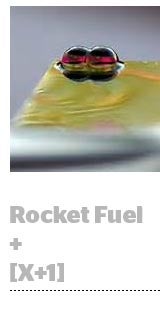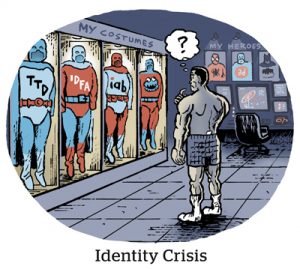 Programmatic ad network Rocket Fuel will acquire [x+1], an older ad tech company with a dual demand-side platform (DSP) and data-management platform (DMP) offering. The estimated value of the deal is $230 million.
Programmatic ad network Rocket Fuel will acquire [x+1], an older ad tech company with a dual demand-side platform (DSP) and data-management platform (DMP) offering. The estimated value of the deal is $230 million.
The acquisition brings Rocket Fuel a strong direct-to-advertiser capability – an area where it is seen as lacking and where [x+1] has strength through client relationships with major marketers such as Volkswagen, Lionsgate and Intuit. [X+1] is also known for a first-party data-centric approach that leverages site optimization and audience targeting.
“The addition of [x+1] will allow Rocket Fuel to expand its portfolio of solutions to a larger addressable market,” Rocket Fuel CEO George John said in a statement. “Through this merger of talent, we will be able to offer our customers a comprehensive platform to more easily leverage their growing digital data assets. Our combined technologies will deliver exceptional results across the spectrum of online and offline channels.”
Under the deal’s terms, Rocket Fuel will pay $100 million in cash and another approximately $130 million (5.4 million shares) of Rocket Fuel common stock. The transaction will close in Q4.
The acquisition was announced simultaneously with Rocket Fuel’s second quarter earnings, in which it reported revenue less media costs of $54.7 million – 84% higher than Q2 2013. (Read the release.) However the company struck a downbeat note, lowering 2014 guidance owing to a confluence of negative trends: agencies directing more ad spend to trading desks or to direct partnerships with demand-side platforms, agencies avoiding exchange buying due to concerns over botnet traffic and advertisers and agencies managing programmatic spend directly using software.
Buying [x+1] will in part help the company to address the agency and marketer trends, according to John. “We’re acquiring [x+1] as a way to inject enterprise software and SaaS DNA into Rocket Fuel,” he said. “[X+1]’s know-how around enterprise software will be a powerful complement to our capabilities in achieving … results.”
Rocket Fuel shares fell in after-hours trading.
Redwood City, Calif.-based Rocket Fuel is primarily focused on driving performance advertising campaigns. It has been on the prowl for a DMP. It was rumored to be the second-place bidder for pure-play data platform BlueKai, before Oracle agreed to snap up the company earlier this year for an estimated $350 million.
Rocket Fuel had $218 million on hand as of the end of Q1 2014, along with about 800 employees. To these will be added [x+1]’s 160 staff.
Once the acquisition goes through, John will need to figure out how to integrate his company’s managed services ad network platform with [x+1]’s core self-serve DSP/DMP product, called Origin Platform, in order to avoid having separate technologies and optimization algorithms for the two types of business.
Rocket Fuel has a fledgling self-service capability in Japan, through a partnership with Dentsu-owned cyber communications inc. In recent comments to investors, it has heralded this investment and has signaled plans to pursue direct-to-advertiser business in the US as well – an ambition that the acquisition of [X+1] will help fulfill. As AdExchanger has reported, the trend toward in-house management of programmatic spend is gaining momentum, putting pressure on ad tech platforms dependent on insertion orders for revenue.
The acquisition is among the largest in a string of recent mergers involving DMPs (the second-largest to be exact, behind BlueKai-Oracle) that has also seen the acquisitions of Aggregate Knowledge by Neustar, Knotice by IgnitionOne and AdMobius by Lotame.
A smaller number of DSPs also have been acquired, most notably Sociomantic, which Tesco-owned Dunnhumby snapped up in April 2013 for $175 million, and SiteScout, acquired by Centro late last year. The only other major DSP acquisition in recent years was Google’s $70 million buy of Invite Media in 2010.
The combination of ad network with data and demand platform may suggest a path to consolidation for the still very jumbled demand-side ad stack. Among the companies in the DSP/DMP arena that remain independent and may be attractive as merger partners are MediaMath, DataXu, Criteo, eXelate and Krux.
Rocket Fuel’s ability to complete a large transaction of a scaled demand-side technology platform is a reminder of its continued clout, in spite of the roughing up it has received from public investors since going public last year.
[X+1], for its part, has been through several iterations over the years. Originally founded as Poindexter Systems, the company has raised $45 million from Intel Partners and other investors, and has tilled that money into enhancing the cross-device and CRM capabilities of its platform. Its most recent enhancement was designed to improve its ability to make offline-online connections.
In a February 2013 interview with AdExchanger, CEO John Nardone said that on behalf of one banking industry client, “We’ve linked the device IDs across multiple computers and devices for their customers, because you can complete the linkage through a login. You look in to online banking tools through your computer at work and at home. You answer an email on your mobile device. We’ve linked that together and that links back to your account number.”
[X+1] management is believed to have been seeking a buyer for at least a year. The DSP space is a particularly difficult area in which to compete, as companies must spend aggressively to add features such as video, tag management or cross-device user identification, only to have those features commoditized or improved upon by specialist competitors such as video DSPs and mobile DSPs. As such, many companies in the space are burning cash at a fast clip and must frequently go back to the VC trough in order to remain competitive. [X+1] competitor Turn recently raised $80 million in a round that valued the company at approximately $700 million.
This escalation of venture funding, and the resulting high valuations for DSP companies, has created a Catch-22 of sorts for many, where companies must go public, raise funds or find a buyer.
Update: Mercedes-Benz was removed from list of [X+1] client list, since they are no longer a customer.














